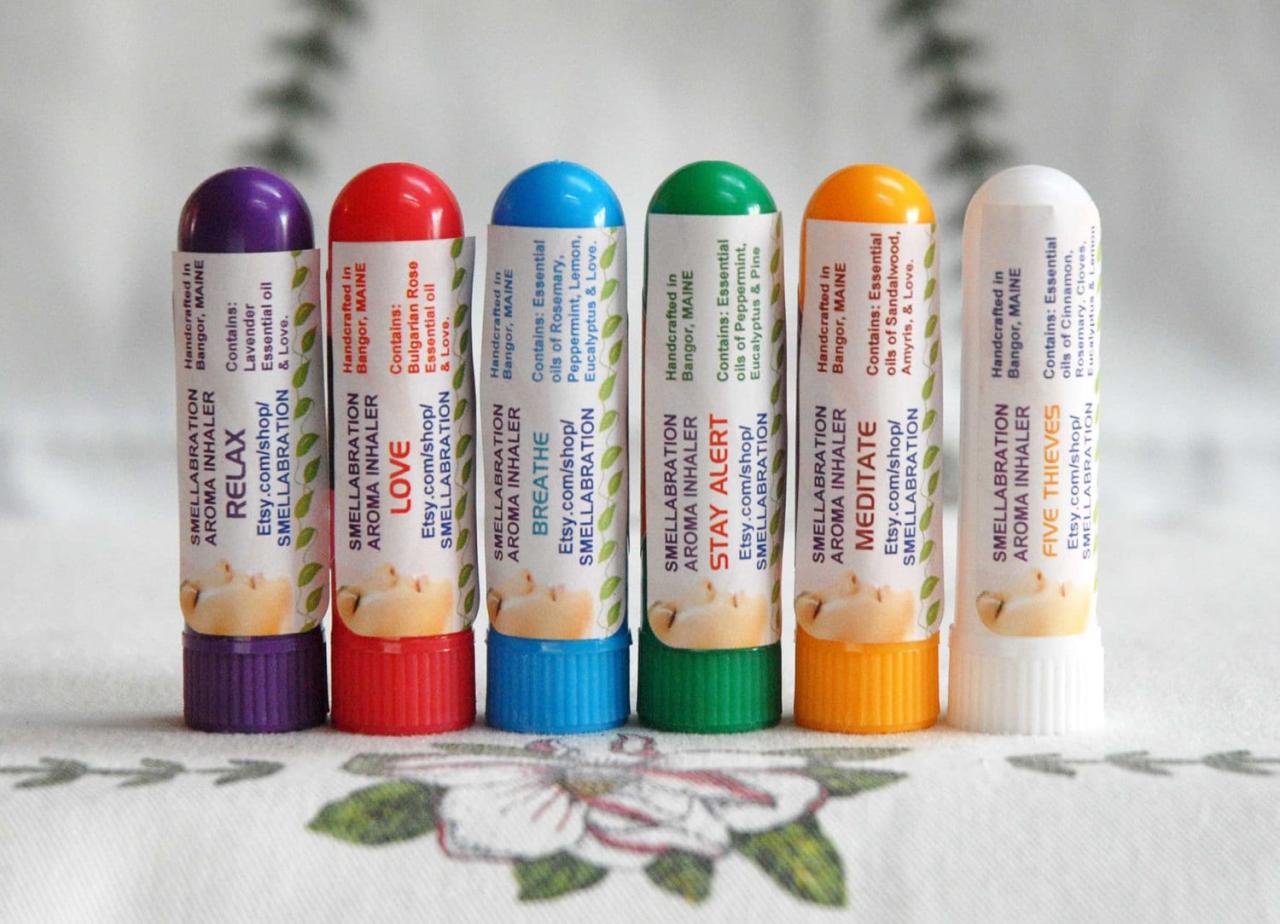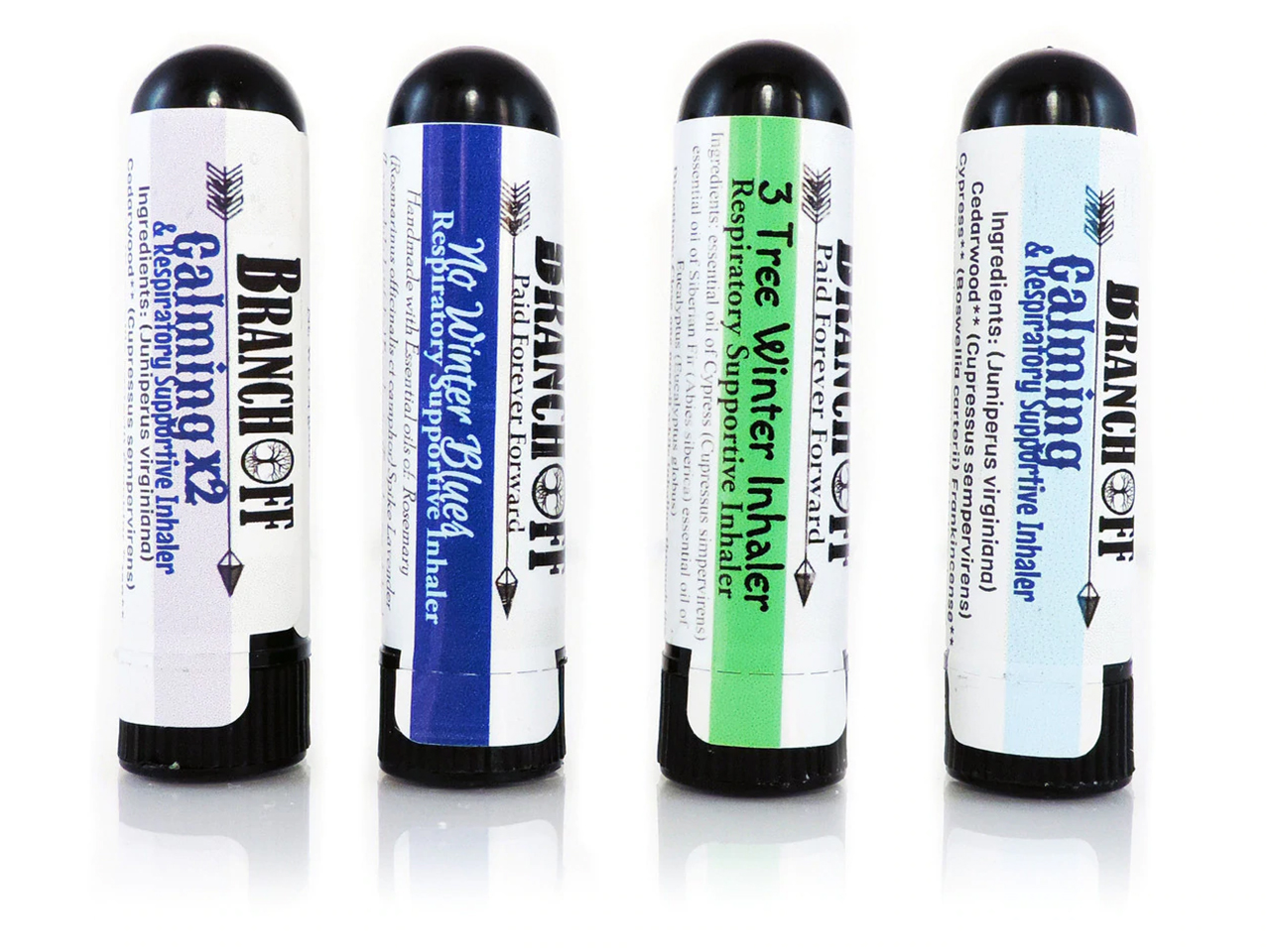Step into the aromatic realm of aromatherapy inhalers, where scents and wellness intertwine. These portable devices harness the power of essential oils, offering a convenient and effective way to experience their therapeutic benefits. From stress relief to respiratory support, aromatherapy inhalers have become an indispensable tool for those seeking natural remedies and holistic well-being.
In this comprehensive guide, we delve into the world of aromatherapy inhalers, exploring their types, essential oils, applications, and usage techniques. Get ready to discover the transformative power of scents and how they can enhance your physical, mental, and emotional health.
Aromatherapy Inhalers: An Introduction

Aromatherapy inhalers are small, portable devices that allow you to inhale essential oils. Essential oils are concentrated plant oils that have been used for centuries for their therapeutic properties. When inhaled, essential oils can have a variety of effects on the body and mind, including reducing stress, improving sleep, and boosting energy.
Aromatherapy inhalers are a convenient way to enjoy the benefits of essential oils. They are easy to use and can be taken with you wherever you go. Inhalers are also a good option for people who are sensitive to essential oils, as they allow you to control the amount of oil you inhale.
Common Essential Oils Used in Aromatherapy Inhalers
There are many different essential oils that can be used in aromatherapy inhalers. Some of the most common include:
- Lavender: Lavender is a relaxing oil that can help to reduce stress and anxiety. It is also known to promote sleep.
- Peppermint: Peppermint is an invigorating oil that can help to improve focus and concentration. It is also known to relieve headaches and nausea.
- Eucalyptus: Eucalyptus is a decongestant oil that can help to clear the sinuses and improve breathing. It is also known to boost energy and alertness.
- Tea tree oil: Tea tree oil is an antiseptic oil that can help to fight infection and boost the immune system. It is also known to help clear acne and other skin problems.
- Lemon: Lemon is a refreshing oil that can help to improve mood and energy levels. It is also known to help boost the immune system and promote digestion.
Benefits and Potential Uses of Aromatherapy Inhalers
Aromatherapy inhalers can provide a variety of benefits, including:
- Reducing stress and anxiety
- Improving sleep
- Boosting energy
- Relieving headaches and nausea
- Clearing congestion and improving breathing
- Fighting infection and boosting the immune system
- Clearing acne and other skin problems
- Improving mood and energy levels
Aromatherapy inhalers can be used for a variety of purposes, including:
- Stress relief: Inhaling lavender or peppermint oil can help to reduce stress and anxiety.
- Sleep improvement: Inhaling lavender or chamomile oil can help to promote sleep.
- Energy boost: Inhaling peppermint or eucalyptus oil can help to improve focus and concentration.
- Headache relief: Inhaling peppermint or lavender oil can help to relieve headaches.
- Nausea relief: Inhaling peppermint or ginger oil can help to relieve nausea.
- Congestion relief: Inhaling eucalyptus or tea tree oil can help to clear congestion and improve breathing.
- Infection prevention: Inhaling tea tree oil or eucalyptus oil can help to fight infection and boost the immune system.
- Skin care: Inhaling tea tree oil or lavender oil can help to clear acne and other skin problems.
- Mood improvement: Inhaling lemon or orange oil can help to improve mood and energy levels.
Types of Aromatherapy Inhalers
Aromatherapy inhalers come in various forms, each offering unique features and benefits. Understanding the different types available can help you choose the one that best suits your needs.
Nasal Inhalers
Nasal inhalers are small, tube-shaped devices that deliver essential oils directly to the nasal passages. They are typically used for respiratory issues such as congestion, allergies, and asthma.
- Advantages:Direct delivery to the nasal passages, quick relief for respiratory problems.
- Disadvantages:Can be irritating for some individuals, not suitable for all essential oils.
- Examples:Vicks VapoInhaler, Breathe Right Nasal Strips
Stick Inhalers
Stick inhalers are portable devices that resemble a lipstick or deodorant stick. They contain a wick that absorbs essential oils and releases them when inhaled.
- Advantages:Convenient and discreet, can be used anytime and anywhere.
- Disadvantages:Limited oil capacity, may not provide as strong a scent as other types.
- Examples:Inhaler by Prim Botanicals, Aura Cacia Aromatherapy Stick
Diffuser Inhalers
Diffuser inhalers are small, handheld devices that disperse essential oils into the air. They create a diffused mist that can be inhaled for a more subtle and ambient aromatic experience.
- Advantages:Creates a calming and relaxing atmosphere, can be used in larger spaces.
- Disadvantages:Requires electricity or batteries, may not be as portable as other types.
- Examples:Vitruvi Stone Diffuser, Saje Aroma Om Diffuser
Essential Oils for Aromatherapy Inhalers
Aromatherapy inhalers offer a convenient and effective way to harness the therapeutic benefits of essential oils. Choosing the right essential oils for your inhaler is crucial to ensure you experience the desired effects. Here’s a comprehensive list of essential oils commonly used in aromatherapy inhalers, along with their therapeutic properties and benefits:
Essential Oils for Relaxation and Sleep
- Lavender:Calming, promotes relaxation, and improves sleep quality.
- Chamomile:Soothes nerves, reduces anxiety, and promotes tranquility.
- Bergamot:Uplifts mood, relieves stress, and promotes restful sleep.
- Ylang-Ylang:Balances emotions, promotes relaxation, and enhances sleep.
- Sandalwood:Grounding, promotes inner peace, and aids in meditation.
Essential Oils for Energy and Focus
- Peppermint:Invigorates, improves alertness, and enhances focus.
- Rosemary:Stimulates the mind, improves memory, and reduces fatigue.
- Eucalyptus:Clears the head, promotes alertness, and eases respiratory issues.
- Lemon:Uplifts mood, increases energy levels, and improves concentration.
- Ginger:Energizing, stimulates circulation, and reduces nausea.
Essential Oils for Respiratory Support
- Eucalyptus:Clears congestion, reduces inflammation, and eases breathing.
- Tea Tree:Antibacterial, antiviral, and expectorant, helps fight respiratory infections.
- Lavender:Calming, reduces anxiety, and promotes restful sleep, which can benefit those with respiratory issues.
- Ravensara:Antiviral, expectorant, and decongestant, helps clear congestion and ease breathing.
- Pine:Expectorant, decongestant, and antimicrobial, helps clear airways and reduce inflammation.
Essential Oils for Pain Relief
- Peppermint:Analgesic, reduces pain, and improves circulation.
- Lavender:Calming, reduces anxiety, and promotes relaxation, which can help manage pain.
- Chamomile:Anti-inflammatory, soothes pain, and reduces muscle spasms.
- Ginger:Anti-inflammatory, reduces pain, and improves circulation.
- Frankincense:Analgesic, anti-inflammatory, and promotes healing.
How to Use Aromatherapy Inhalers
Aromatherapy inhalers are portable devices that allow you to inhale essential oils for therapeutic benefits. Using them correctly is crucial for maximizing their effectiveness and safety.
Proper Technique
To use an aromatherapy inhaler:
- Remove the cap and place the inhaler close to your nose.
- Inhale deeply through your nose for 5-10 seconds.
- Hold your breath for a few seconds.
- Exhale slowly through your mouth.
- Repeat for 1-3 minutes or as directed.
Frequency and Duration
The frequency and duration of aromatherapy inhaler use vary depending on the essential oils used and the desired effect. Generally, it’s recommended to use them for:
- Short-term relief:1-3 minutes, several times a day as needed.
- Ongoing support:5-10 minutes, 1-2 times a day.
Safety Precautions and Contraindications
Aromatherapy inhalers are generally safe for most people. However, there are a few precautions to consider:
- Avoid using essential oils if you are pregnant, breastfeeding, or have certain medical conditions.
- Use only pure, undiluted essential oils.
- Do not use inhalers for extended periods without consulting a healthcare professional.
- Store inhalers out of reach of children and pets.
Applications of Aromatherapy Inhalers
Aromatherapy inhalers are versatile tools that offer a wide range of applications, providing both physical and emotional benefits. They can be used for:
Stress Relief and Relaxation
Certain essential oils, such as lavender, chamomile, and bergamot, possess calming and relaxing properties. Inhaling these scents through an aromatherapy inhaler can help reduce stress, anxiety, and promote a sense of tranquility.
Respiratory Support
Eucalyptus, peppermint, and rosemary oils are known for their decongestant and expectorant properties. Aromatherapy inhalers containing these oils can help clear nasal passages, reduce inflammation, and improve breathing.
Mood Enhancement
Essential oils like citrus, peppermint, and rosemary can uplift mood and increase alertness. Inhaling these scents through an aromatherapy inhaler can help combat fatigue, improve focus, and boost overall well-being.
Sleep Improvement
Lavender, chamomile, and valerian root oils have sedative properties that can aid in sleep. Aromatherapy inhalers containing these oils can help relax the mind and body, promote restful sleep, and reduce insomnia.
Pain Management
Some essential oils, such as peppermint, eucalyptus, and clove, have analgesic and anti-inflammatory properties. Aromatherapy inhalers containing these oils can help relieve headaches, muscle pain, and other minor aches and pains.
Ending Remarks

Aromatherapy inhalers have emerged as a valuable tool for those seeking natural and effective ways to improve their well-being. Whether it’s stress relief, respiratory support, mood enhancement, sleep improvement, or pain management, these portable devices offer a convenient and customizable approach to harnessing the power of essential oils.
By understanding the different types, essential oils, and applications of aromatherapy inhalers, you can tailor their use to your specific needs and experience the transformative benefits of these aromatic wonders.